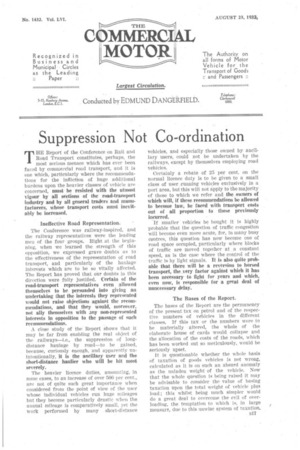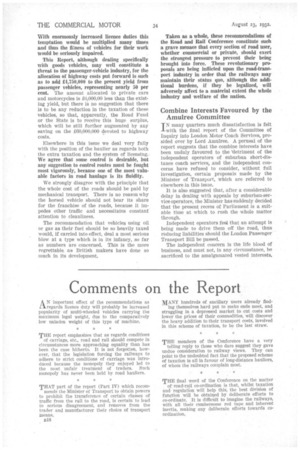Suppression Not Co-ordination
Page 35

Page 36

If you've noticed an error in this article please click here to report it so we can fix it.
THE Report of the Conference on Rail and Road Transport constitutes, perhaps, the most serious menace which has ever been faced by commercial road transport, and it is one which, particularly where the recommendations for the infliction of huge additional burdens upon the heavier classes of vehicle are concerned, must be resisted with the utmost vigour ' by all sections of the road-transport industry and by all general traders and manufacturers, whose transport costs must inevit ably be increased. .
Ineffective Road Representation.
The Conference was railway-inspired, and the railway representatives were the leading men of the four groups. Right at the beginning, when we learned the strength of this opposition, we expressed grave doubts as to the effectiveness of the representation of road transport, and particularly of the haulage interests which are to be so vitally affected. The Report has proved that our doubts in this direction were fully justified. Certain of the road-transport representatives even allowed themselves to be persuaded into giving an undertaking that the interests they represented would not raise objections against the recommendations, and that they would, moreover, not ally themselves with any non-represented interests in opposition to the Passage of such recommendations. .
A close study of the Report shows that it may be far from enabling the real object of the railways—i.e., the suppression of longdistance haulage by road—to be gained, because, curiously enough, and apparently unintentionally, it is the ancillary user and the short-distance haulier who Will be hit most severely.
The heavier licence duties, amounting, in some cases, to an increase of over 500 per cent., are not of quite such great importance when . considered from the point of view of the user whose individual vehicles run huge mileages but they become particularly drastic when the annual mileage is comparatively small, yet the work performed by many . short-distance vehicles, and especially those owned by ancillary users, could not be undertaken . by the railways, except by themselves employing road vehicles.
Certainly a rebate of 25 per cent, on the normal licence duty is to be given to a small class of user ,running vehicles exclusively in a port area, but this will not apply to the majority of those to which we refer and the . owners of which will, if these recommendations be allowed to become law, be faCed with transport costs out of all • proportion to those previously incurred.
If smaller vehicles hq bought it is highly probable that the question of traffic congestion Will become even more acute, for, In many busy centres, this question has now become one of road space ocCupied, particularly where blocks of traffic are moved together at . a constant speed, as is the case where the, control of the traffic is by light signals. It is also quite probable that there will be a reversion to horsed transport, the .very factor against which it has been necessary to tight for years and which, even now, is responsible for a great deal of unnecessary delay.
The Bases of the Report..
The bases of the Report are the permanency of the present tax on petrol and of the respective numbers tof vehicles in the different classes. If this tax or the numbers were to be materially . altered, the whole of the elaborate house of cards would collapse and the allocation of the costs of the roads, which has been worked out so meticulously, would be seriously upset.
It is questionable whether the whole basis of taxation of goods vehicles is not wrong, calculated as it is on such an absurd anomaly as the unladen weight of the vehicle. Now that the whole question is being raised it may be advisable to consider the value of basing taxation upon the total weight of vehicle plus load; this whilst being much simpler would do a great deal to overcome the evil of overloading, the temptation to which is, in large tneasurt, due to this unwise system of taxation. With enormously increased licence duties this temptation would be multiplied many times and thus the fitness of vehicles for their work would be seriously impaired.
This Report, although dealing specifically with goods vehicles, may well constitute a threat to the passenger-vehicle industry, for the allocation of highway costs put forward is such as to add £4,750,000 to the present yield from passenger vehicles, representing nearly 50 per cent. The amount allocated •to private cars and motorcycles is £6,000,00 less than the existing yield, but there is no suggestion that there is to be any reduction in the taxation of these vehicles, so that, apparently, the Road Fund or the State is to receive this huge surplus, which will be still further augmented by any saving on the £60,000,000 devoted to highway costs.
Elsewhere in this issue we deal very fully with the position of the haulier as regards both the extra taxation and the system of licensing.We agree that some control is desirable, but any suggestion to control routes must be fought most vigorously, because one of the most valuable factors in road haulage is its fluidity.
We strongly disagree with the principle that the whole cost of the roads should be paid by mechanical transport. There is no reason why the horsed vehicle should not bear its share for the franchise of the roads, because it impedes other traffic and necessitates constant attention to cleanliness.
The recommendation that vehicles using oil or gas as their fuel should be so heavily taxed would, if carried into effect, deal a most serious blow at a type which is in its infancy, so far as numbers are concerned. This is the more regrettable, as, British makers have done so much in its development. Taken as a whole, these recommendations of the Road and Rail Conference constitute such a grave menace that every section of road user, whether commercial or private, should exert the strongest pressure to prevent their being brought into force. These revolutionary proposals are being inflicted upon the road-transport industry in order that the railways may maintain their status quo, although the additional burdens, if they be legalized, will adversely affect to a material extent the whole industry and welfare of the nation.
Combine Interests Favoured by the Amulree Committee
TN many quarters much dissatisfaction is felt -I-with the final report of the Committee of Inquiry into London Motor Coach Services, presided over by Lord Amulree. A perusal of the report suggests that the combine interests have been unduly favoured to the 'detriment of the independent operators of suburban short-distance coach services, and the independent concerns have refused to consider, without full investigation, certain proposals made by the Minister of Transport, which are referred to elsewhere in this issue.
It is also suggested that, after a considerable delay in dealing with appeals by suburban-service operators, the Minister has suddenly decided that the present recess of Parliament is a suitable time at which to rush the whole matter through. Independent operators feel that an attempt is being made to drive them off the road, thus reducing liabilities should the London Passenger Transport Bill be passed. The independent concern is the life blood of business, and must not, in any circumstance, be sacrificed to the anialgamated vested interests.




































































































